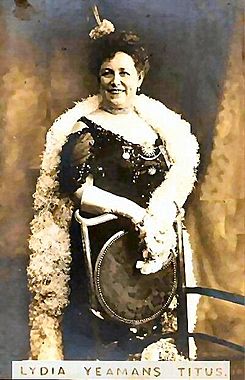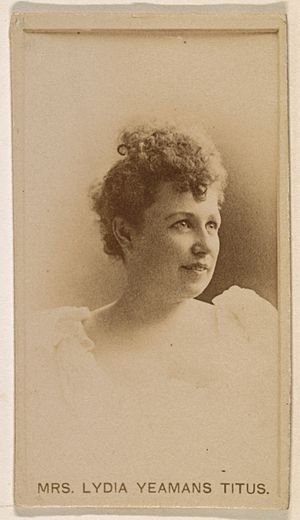Lydia Yeamans Titus facts for kids
Quick facts for kids
Lydia Yeamans Titus
|
|
|---|---|

Titus, c. 1910
|
|
| Born |
Lydia Annie Yeamans
12 December 1857 Tasman Sea, between Sydney and Melbourne
|
| Died | 30 December 1929 (aged 72) Los Angeles, California, U.S.
|
| Occupation | Stage and screen actress |
| Spouse(s) | Frederick J. Titus |
Lydia Yeamans Titus (born December 12, 1857 – died December 30, 1929) was an amazing singer, dancer, and actress. She was born in Australia but became famous in America. Lydia had a very long career in both vaudeville (a type of stage show) and movies. People especially loved her "Baby-Talk" act and her beautiful singing of the song Sally in Our Alley. King Edward VII of England was so impressed that he gave her a special gold pin with the song's notes made of diamonds! Later in her life, Lydia became a pioneer in early movies, appearing in over 130 films.
Contents
Lydia's Early Life
Lydia Annie Yeamans was born in a very unusual place: on a ship sailing between Sydney and Melbourne, Australia! Her dad, Edward "Ned" Yeamans, was an American circus clown and comedian. Her mom, Annie Griffiths, was a British-born circus rider. They met and married when Annie was young, after she joined an American circus touring Australia.
In the mid-1860s, Lydia's parents and her baby sister Jennie moved to San Francisco, California. They had been on a long circus tour that included countries like Japan, China, and the Philippines. Lydia and her younger sister Emily stayed in Sydney with their grandparents. They didn't see their mom and Jennie again for almost ten years. Lydia's dad passed away after performing in circuses across the American West. This led her mom, Annie Yeamans, to have a long and successful career in vaudeville and theater.
Lydia and her sisters, Emily and Jennie, all started acting on stage when they were children. Jennie was very popular when they were young. Sadly, both Jennie and Emily passed away when they were still quite young.
Lydia's Stage Career

Lydia started her solo career in 1875. She performed as a singer and dancer with Tony Pastor's vaudeville company. By the late 1880s, she was known as the "Anglo-American Lyric Star." She became very popular overseas, touring in Great Britain, Australia, and New Zealand.
Lydia was so well-liked that she became an honorary member of the Elks Lodge in Buffalo, New York, in 1900. She was also made an honorary member of the San Francisco lodge. Her performances were known for being amazing. She could imitate people so well that audiences were captivated by her unique personality on stage.
Her singing of "Sally in Our Alley" was especially famous. One newspaper, Punch, wrote in 1887 that her singing was so charming that the audience gave her three encores! Another magazine, Metropolitan Magazine, said in 1897 that Lydia had no equal when it came to singing about child-life. They said her performances of songs like "Peggy Cline" and "Sally in Our Alley" were legendary in vaudeville history. She was earning a very good salary of two hundred dollars a week.
Lydia's Film Career
Lydia Titus started her movie career in 1911. Her first film was a short movie called Tale of Two Cities, made by Vitagraph Studios in Brooklyn, New York. After 1915, she appeared in films from other big studios like Universal Studios.
In 1919, she acted alongside the famous Geraldine Farrar in The World and Its Woman. In this silent film, Lydia sang some of the songs she had performed for English royalty years earlier.
Lydia's long film career covered most of the silent movie era. She might have even continued into "talkies" (movies with sound) if she hadn't passed away in 1929. Her very last movie was an early talkie called Lummox, which came out just a few weeks after she died. Lydia acted with many of Hollywood's biggest stars. These included Rudolph Valentino in A Society Sensation (1918), Lon Chaney in The Hunchback of Notre Dame, Ronald Colman in Tarnish (1924), and Jackie Coogan in The Rag Man.
Actress Colleen Moore once shared a story about Lydia. Colleen had bought an expensive fur coat. Her director, Charles Brabin, pointed out Lydia on the set. He told Colleen that Lydia had once lived a life of luxury as a star on the London stage and had even received a special brooch from King Edward. But she had spent all her money and was now working in small movie roles just to make a living. Colleen understood the message and returned her coat.
Lydia's Marriage
Lydia was married to Frederick J. Titus, who was an actor and a pianist. He often played piano for her acts and helped manage her career. They got married around 1886. Lydia and Frederick did not have any children.
Lydia's Passing
Lydia Yeamans Titus passed away in Los Angeles on December 30, 1929. She was 72 years old and had suffered a paralytic stroke. Because she was born at sea, Lydia asked in her will that her remains be buried at sea. After her funeral, her ashes were scattered over the Pacific Ocean off the coast of Southern California. Her husband, Frederick, had passed away in 1918.
Many people remembered Lydia fondly. Photoplay Magazine wrote in 1930 that Lydia had given $5,000 to the Actors' Fund to help others. This same fund, along with help from her Hollywood friends, cared for her during her last days.
Partial Filmography
- Jane (1915)
- The Right to Be Happy (1916)
- David Garrick (1916)
- He Fell in Love with His Wife (1916)
- High Speed (1917)
- The Edge of the Law (1917)
- The Birth of Patriotism (1917)
- A Burglar for a Night (1918)
- The Fear Woman (1919)
- The Peace of Roaring River (1919)
- The World and Its Woman (1919)
- Nurse Marjorie (1920)
- Go and Get It (1920)
- Queenie (1921)
- The Mad Marriage (1921)
- The Concert (1921)
- The Mistress of Shenstone (1921)
- Beating the Game (1921)
- Beau Revel (1921)
- The Freeze-Out (1921)
- The Invisible Power (1921)
- Nobody's Fool (1921)
- His Nibs (1921)
- A Girl's Desire (1922)
- The Glory of Clementina (1922)
- Two Kinds of Women (1922)
- The Ghost Patrol (1923)
- Tarnish (1924)
- Big Timber (1924)
- The Lullaby (1924)
- In Fast Company (1924)
- Young Ideas (1924)
- The Fast Worker (1924)
- Head Winds (1925)
- Up the Ladder (1925)
- The Arizona Romeo (1925)
- Twinkletoes (1926)
- Lure of the Night Club (1927)
- Night Life (1927)
- Heroes in Blue (1927)
- The Water Hole (1928)
- Sweet Sixteen (1928)
- While the City Sleeps (1928)
- Shanghai Lady (1929)
- The Voice of the Storm (1929)
- Lummox (1930)

